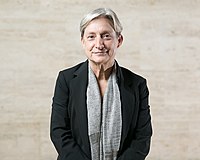Judith Butler
Judith Pamela Butler is a cisgender American philosopher and gender theorist whose work has influenced political philosophy, ethics, and the fields of third-wave feminist, queer theory, and literary theory. Her 1990 book Gender Trouble introduced the idea of performing or "doing" gender[1] and criticized the gender binary.[2]
 Butler in 2018 | |
| Date of birth | February 24, 1956 |
|---|---|
| Place of birth | Cleveland, Ohio, USA |
| Nationality | American |
| Gender identity | Cis woman |
| Occupation | Philosopher, writer |
In 2012 she was presented with the Theodor W. Adorno Award for outstanding achievement in philosophy.
In 2013, Darin Barney of McGill University wrote that:
| « | Butler's work on gender, sex, sexuality, queerness, feminism, bodies, political speech and ethics has changed the way scholars all over the world think, talk and write about identity, subjectivity, power and politics. It has also changed the lives of countless people whose bodies, genders, sexualities and desires have made them subject to violence, exclusion and oppression.[3] | » |
Butler is a lesbian and lives with her partner Wendy Brown, a political theorist; they have a son together.
On transgender rights specifically, Butler has said:
| « | It is always brave to insist on undergoing transformations that feel necessary and right even when there are so many obstructions to doing so, including people and institutions who seek to pathologize or criminalize such important acts of self-definition. I know that for some feels less brave than necessary, but we all have to defend those necessities that allow us to live and breathe in the way that feels right to us. Surgical intervention can be precisely what a trans person needs – it is also not always what a trans person needs. Either way, one should be free to determine the course of one's gendered life.
[...] Nothing is more important for transgender people than to have access to excellent health care in trans-affirmative environments, to have the legal and institutional freedom to pursue their own lives as they wish, and to have their freedom and desire affirmed by the rest of the world. This will happen only when transphobia is overcome at the level of individual attitudes and prejudices and in larger institutions of education, law, healthcare, and kinship. [...]I think we have to accept a wide variety of positions on gender. Some want to be gender-free, but others want to be free really to be a gender that is crucial to who they are. [...]Gender Trouble was written about 24 years ago, and at that time I did not think well enough about trans issues. Some trans people thought that in claiming that gender is performative that I was saying that it is all a fiction, and that a person’s felt sense of gender was therefore “unreal.” That was never my intention. I sought to expand our sense of what gender realities could be.[4] |
» |
Selected works
- Gender Trouble (1990)
- Imitation and Gender Insubordination (1990)
- Bodies That Matter (1993)
- Excitable Speech (1997)
- Undoing Gender (2004)
- Giving an Account of Oneself (2005)
Further reading
- Finlay, Toby (2017). Non-Binary Performativity: A Trans-Positive Account of Judith Butler's Queer Theory (PDF)
References
- ↑ Fischer, Molly (21 June 2016). "Think Gender Is Performance? You Have Judith Butler to Thank for That". The Cut. Retrieved 4 May 2020.
- ↑ "Judith Butler". famousphilosophers.org. Retrieved 4 May 2020.
- ↑ Barney, Darin. "In Defense of Judith Butler". Huffington Post. Retrieved 9 October 2013. CS1 maint: discouraged parameter (link)
- ↑ Williams, Cristan. "Gender Performance: The TransAdvocate interviews Judith Butler". TransAdvocate. Retrieved 4 May 2020.
| This article uses material from the Wikipedia article Judith Butler, which is released under the Creative Commons Attribution-ShareAlike 3.0 Unported License (view authors). |